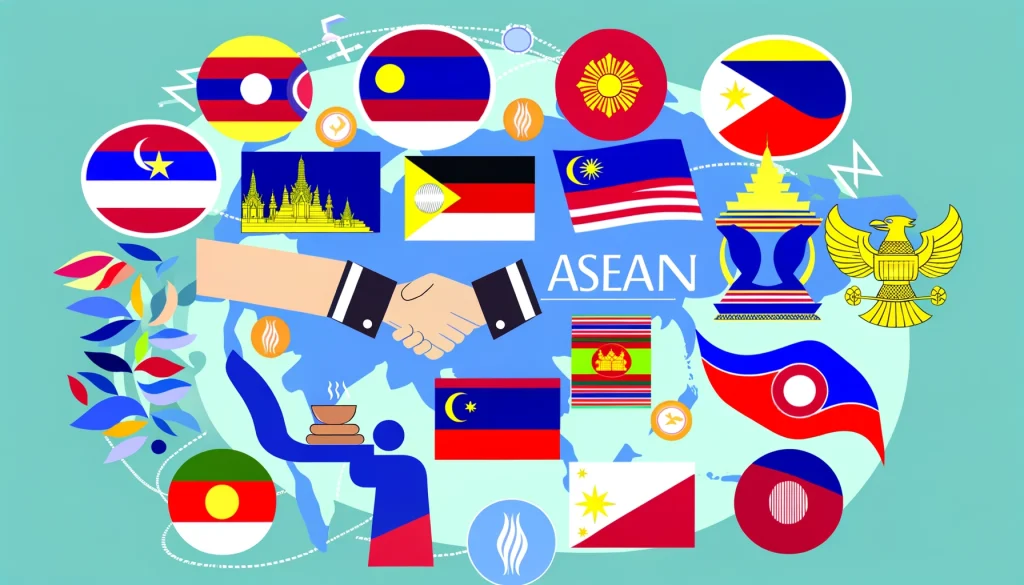The Association of Southeast Asian Nations (ASEAN) represents a pivotal organization in Asia, fostering economic growth, social progress, and cultural development in the region.
Established to promote political and economic cooperation and regional stability, ASEAN plays a crucial role in the diplomatic landscape of Southeast Asia.
What is ASEAN?
The Association of Southeast Asian Nations (ASEAN) was founded on August 8, 1967, in Bangkok, Thailand, with the signing of the ASEAN Declaration (Bangkok Declaration) by the founding fathers of ASEAN: Indonesia, Malaysia, Philippines, Singapore, and Thailand.
Since then, ASEAN has expanded to include Brunei, Vietnam, Laos, Myanmar, and Cambodia, bringing the total number of member countries to ten.
Origins of ASEAN
ASEAN was established during a period of significant geopolitical change and challenges in Southeast Asia. I
ts creation was motivated by the need for a cohesive organization to enhance regional cooperation, reduce the risk of regional conflicts, and serve as a collective voice in global forums.
Member Countries of ASEAN
The ten countries that currently make up ASEAN are:
- Brunei Darussalam
- Cambodia
- Indonesia
- Laos
- Malaysia
- Myanmar
- Philippines
- Singapore
- Thailand
- Vietnam
ASEAN Visa Policies
One of ASEAN’s long-term goals is to establish a single visa scheme, similar to the Schengen Agreement in Europe, to facilitate tourism and business.
While this goal has yet to be fully realized, several ASEAN countries have made bilateral agreements to ease travel within the region:
- Visa Exemption Agreements: Many ASEAN countries allow visa-free entry for tourists from fellow ASEAN nations for stays of up to 30 days.
- Visa on Arrival and e-Visa Facilities: Some member countries offer Visa on Arrival (VoA) or e-Visa options to nationals of ASEAN countries, simplifying the process of obtaining entry permits.
Frequently Asked Questions about ASEAN
Q: Does ASEAN have a common currency?
A: No, ASEAN does not have a common currency. Each member country uses its national currency.
Q: Can I travel within ASEAN countries using a single visa?
A: Currently, there is no single ASEAN visa that allows unrestricted travel between all member countries. Travelers must obtain visas according to the requirements of each individual country.
Q: What are the main objectives of ASEAN?
A: ASEAN aims to accelerate economic growth, social progress, and cultural development in the region, and to promote regional peace and stability through abiding respect for justice and the rule of law.
Q: How does ASEAN impact trade?
A: ASEAN has established the ASEAN Free Trade Area (AFTA) to boost trade between member countries through the elimination of tariffs and non-tariff barriers.
Q: Is ASEAN part of the United Nations?
A: While ASEAN is not part of the United Nations, it is recognized as a major regional bloc and maintains a dialogue partner status with the UN, contributing to regional and global policy discussions.
Understanding ASEAN and its visa policies is essential for anyone looking to engage with Southeast Asia, whether for travel, business, or diplomacy. The association continues to evolve, aiming to enhance regional integration and cooperation among its member countries.



